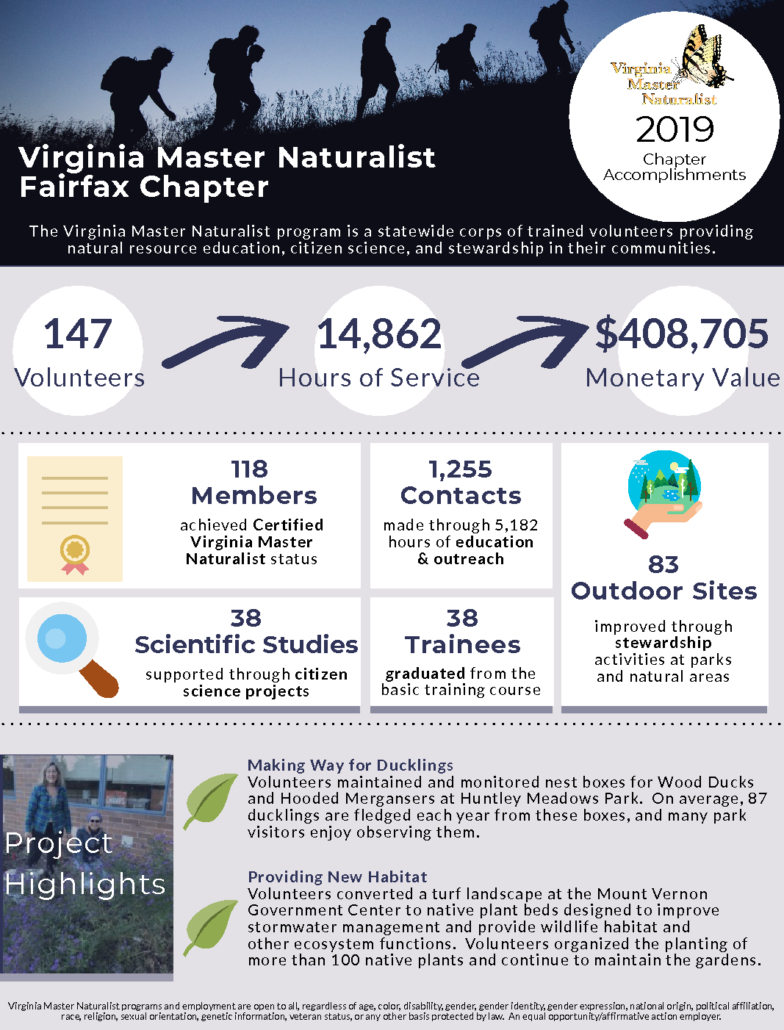VMN Annual Report Response for 2019, Fairfax Chapter
Our parent organization, Virginia Master Naturalists, has created an infographic of our chapter’s work from the annual report posted earlier.


Our parent organization, Virginia Master Naturalists, has created an infographic of our chapter’s work from the annual report posted earlier.

| VMN HQ is looking for volunteers willing to do a very tedious, at-home computer task of editing the captions for VMN Continuing Education webinar videos. If this fits your skills and interest, see below for details. Volunteers chosen to assist with this project will be able to report their hours to the VMN Statewide Administration project. Cheers, Michelle |
Are you looking for a VMN volunteer opportunity you can do from home? This is a project that I’ve been trying to figure out how to do for a long time, and I think I finally have a way, with your help.
As you know, we have many years’ worth of recorded videos from our Continuing Education Webinar Series. Accessibility best practices for videos include having captions available for people who are deaf or otherwise unable to hear the audio well. The video software we use from Virginia Tech does do automatic captions, but they are done from computer speech recognition and are full of errors. Sometimes the errors are so bad that the text is nonsensical!
What You’ll Do:
We are seeking volunteers to edit the captions for our recorded Continuing Education webinar videos. For each video, I have an unedited captions file that I will send as a starting point. I will also send you a link for streaming the recorded video. You will be asked to:
What You’ll Need:
To Volunteer:
Please contact Michelle Prysby by March 31. I will send out the assignments shortly after that date. I’ll just assign a video to you based on what is available. If we have more volunteers than videos, I will prioritize volunteers who have physical disabilities or injuries that prevent them from doing more physical volunteer work and after that I’ll just do first-come, first-chosen. Please only volunteer if you feel comfortable finding and using the text editor on your computer and feel like you have the necessary attention to detail that this project requires.
This is a great opportunity for volunteers who may need an at-home project, who really like our Continuing Education webinars, who don’t mind tedious tasks, and who have a good eye for details!
Webinar Highlights:
Please come prepared with any and all tick questions, and the presenter will do her best to answer them.
Presenter:
Alexis White is a senior PhD candidate in the Ecological Sciences PhD program at Old Dominion University, working in Professor Holly Gaff’s lab. Lexi is part of the ODU Tick Research Team; a joint venture between Professors Gaff and Hynes who take a multidisciplinary approach to understanding ticks and tick-borne pathogens in Virginia. She completed her Bachelor’s in Wildlife Biology at Unity College in Maine. Her dissertation focuses on exploring local, finite time control of ticks using both mechanical and biological means.
Webinar Details
When: Thursday, 28 February 2019, 12 pm
Meeting Number: 557-678-365
Link to join: Join Webinar
(This link will connect you to the video feed, but you will need to connect your audio separately to hear the speaker. Zoom will prompt you to do that once you have connected the video feed. For technical help visit the Zoom Support Center.)
Link for recordings of this and past webinars: VMN Continuing Education page
